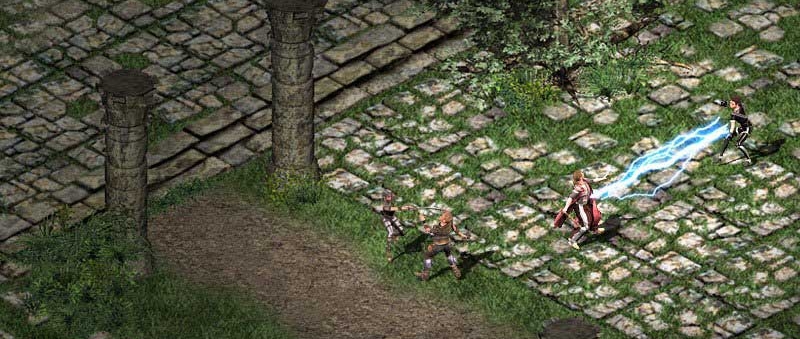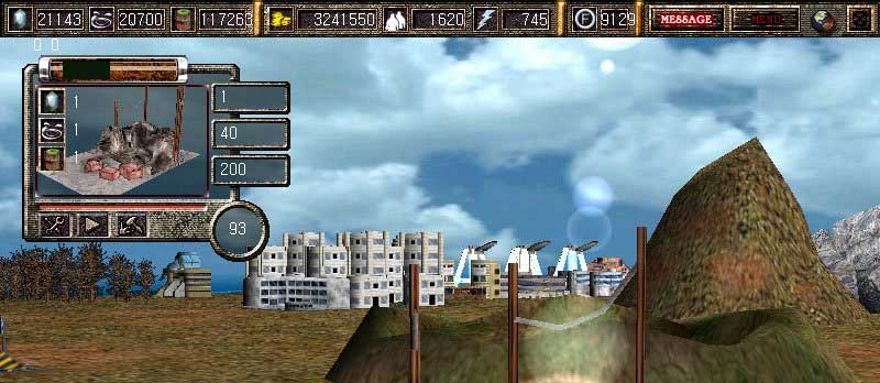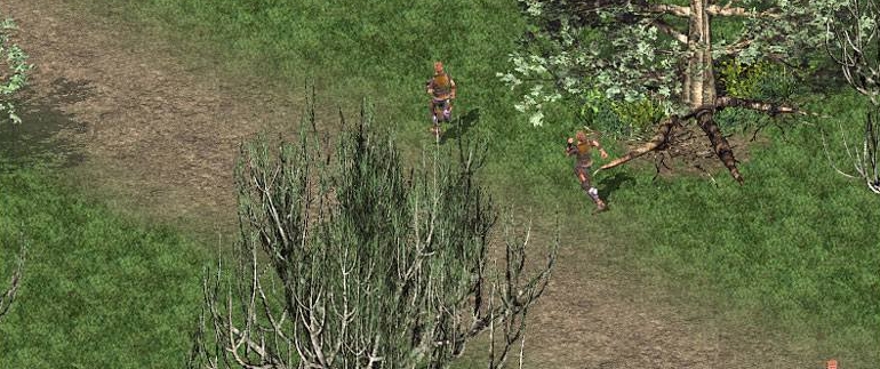
Imagine that one day you wake up, stumble to your computer, and check in on the morning news. Among the various tidbits is a rather surprising notice of a brand-new MMORPG that is not only in the works, but is on the verge of beta testing right the heck now. Would that be enough of a shock to wipe away any vestiges of sleep and generate immediate interest in this title?
For some players during a very short period in 2001, it definitely was.
The game in question is Fallen Age, an isometric MMO that made headlines by announcing its presence in one breath and imminent beta testing in the next. However, Netamin Communication’s game couldn’t quite live up to that promise, and by the end of the year, it had vanished almost as quickly as it arrived. So what was this game and what exactly happened?

The shock announcement
February 21st, 2001. As the MMORPG industry was booming and several studios were hard at work creating titles like Star Wars Galaxies, World of Warcraft, and The Matrix Online, out of the blue a new studio issued a press release that made it seem like it just got the jump on the competition.
“Welcome to the unveiling of Fallen Age, the bold new massively multiplayer online game from Netamin.com that is sure to be the sleeper hit of the year,” the studio posted on its now-defunct site. “From its crisp isometric 3-D graphics to its never-been-done-before colonization sub-game, Fallen Age is coming out of nowhere to make its mark. While our competitors have been concentrating on years of hype with little to show, we’ve been quietly at work.”
Dang. Shots fired. But then:
“We know what you’re thinking. Another promise… another project beginning development. Two years from release? Nope. A year from beta? Nope. Fallen Age is nearly complete! We’re approximately a month away from beta. Yes, you heard right — a month from beta. No three years of hype, no empty promises. Netamin and Fallen Age deliver.”
This statement got a lot of people’s attention in a hurry, as a public beta was scheduled for April 2001 and a launch by the end of the year. Obviously, this was a huge marketing ploy designed to make the competition look slow and plodding while fast-tracking Fallen Age to the public eye. But it all hinged on actually making good on the studio’s words, words that would turn into a deeply ironic commentary before too long.

The colonization MMO
The premise of Fallen Age was that players would venture into an Earth of the far future — 6400 A.D., to be precise. This “science fiction-fantasy hybrid” promised a “game that pleases everyone,” with 126 skills and spells, multiple classes (Fighter, Shaman, and Chakra), sub-classes, 500 levels, consensual PvP, over 10,000 unique items, kill tracking, and in-game property. There would also be a “dynamic spawn system” to squash the then-standard practice of camping particular mobs in other MMOs.
But the real hook here was the incorporation of a colonization game with the MMO, allowing players to inhabit, conquer, and rebuild this fallen world. The studio deemed it a combination of turn-based simulation and real-time strategy in which each player would build up an empire, forge alliances, and go to war with others.
The option to create a colony only became available after a player reached level 30, which meant that everyone had to spend some time getting to know the game world personally. Building up a colony was in any adventurer’s best interest, because only there could players access features like bank storage. The overarching plan was to have adventuring support colonization and vice-versa, encouraging players to engage in both aspects.
The game kept the colonies separate from the adventuring game world so as to avoid the urban sprawl that thousands upon thousands of colonies would eventually produce. What was a little odd in this design is that while Fallen Age’s core gameplay took place in a 2-D isometric world, the colonization sub-game was fully 3-D. This had the effect of making the two sides to this title look like completely different games.
Gamespot took a look at this game in May 2001 and was cautiously optimistic about this setup: “As interesting as the role-playing aspects of Fallen Age are, the colonization mode — especially how it interacts with the rest of the game — is definitely the most intriguing, because you can use it in any number of different ways: You can just build a bank or a warehouse and just use your colony as an overgrown storage facility; you can take a much more economic approach and simply build factories, schools, housing, or other structures to increase your colony’s ability to produce armor or weapons that you can sell to other players; you can even take the aggressive approach and build a massive army with the sole purpose of conquering enemy colonies to eventually become emperor of the server.”
“Fallen Age is innovative not because it does one thing so unique, but because it brings together so many genre’s together into one great game,” said Producer Daniel Manachi in a July interview. “First, it’s not just fantasy or just science fiction, but a sci-fi fantasy game, where you have a mixture of both genres. Second, it’s not just an RPG, and not just a TBS or RTS, but all those three combined. Not only do you play an avatar and level up, find equipment, do quests, and kill monsters, but you also manage an entire colony with its own army and economy.”

Beta and bust
Slipping only a little bit, Netamin began Fallen Age’s beta test about two months after the initial announcement on April 21st, 2001. From what little information is available, the beta wasn’t perfect but it did function and allowed for testers to put it through its paces.
Without any warning signs, the studio abruptly announced on July 27th that it would be putting the game on hold indefinitely. We know very little about the origins and dealings of this studio, but apparently it had a deal going on with “partners in Korea” that fell apart during the summer and led to a swift and brutal end for the game.
“We have run into creative differences with our partners in Korea, and have decided this week that we had no choice but to put the game on hold,” said Manachi in a statement. “As a result, the beta servers will be shut down this weekend. We sincerely apologize to our testers for the time and effort they’ve put into helping test the game and hope we will be able to re-launch the title soon.”
Before the game could fade from the public’s consciousness, the Fallen Age team did state that it was attempting to work out something with Mythic Entertainment to transfer its testers over to Dark Age of Camelot.
It is hard to be disappointed over such a flash-in-the-pan title like Fallen Age, although it seems like a waste that three years were spent on development only to have it flame out months after its announcement. Perhaps if the team had revealed it earlier, it would have generated more interest and shored up a publisher’s interest. Tough to say, and in the end, this remains just another one of the “could have been” MMOs that sailed off into the sunset.
 Believe it or not, MMOs did exist prior to World of Warcraft! Every two weeks, The Game Archaeologist looks back at classic online games and their history to learn a thing or two about where the industry came from… and where it might be heading.
Believe it or not, MMOs did exist prior to World of Warcraft! Every two weeks, The Game Archaeologist looks back at classic online games and their history to learn a thing or two about where the industry came from… and where it might be heading.













